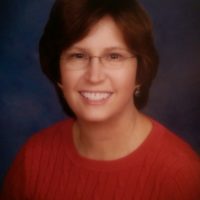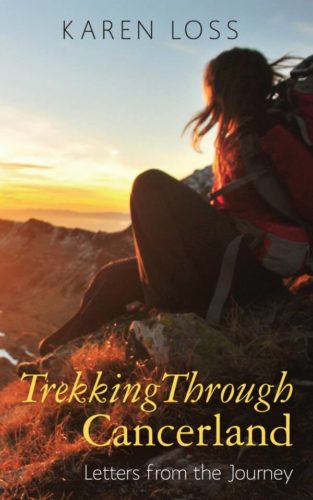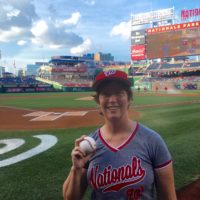 God has blessed me with friendship with some amazing women. One of them is Karen Loss, author of Trekking Through Cancerland . She is a survivor of Stage 4 lung cancer though she never was a smoker. Today, I’d like to share our friendship with you, my readers, so you might be blessed and encouraged if you know someone who has had or is battling cancer.
God has blessed me with friendship with some amazing women. One of them is Karen Loss, author of Trekking Through Cancerland . She is a survivor of Stage 4 lung cancer though she never was a smoker. Today, I’d like to share our friendship with you, my readers, so you might be blessed and encouraged if you know someone who has had or is battling cancer.
 It’s been a little over 4 years since Trekking Through Cancerland was published. I’d like to ask some questions about what God has been teaching you.
It’s been a little over 4 years since Trekking Through Cancerland was published. I’d like to ask some questions about what God has been teaching you.
Barbara: What are your thoughts, looking back over your journey of the past 4 years? When you wrote the book were you expecting to be here at this juncture?
Karen Loss: I was literally an open book on what I expected regarding this whole lung cancer journey. I guess, in the beginning, after I learned the dire 1 and 5-year survival statistics for stage 4 lung cancer patients, I thought there was a good likelihood I might not survive for very long. I never really gave it a lot of thought, though, in terms of calendar expectations. What I did do, is think about how I would hope to be remembered, how I wanted to live my life, what kind of legacy I hoped to leave behind, what kind of funeral I would want…that sort of thing.
B: Where do you stand medically?
KL: After more than 5 1/2 years since my diagnosis with stage 4 lung cancer, I am currently not undergoing any treatment. I’ve had two different courses of chemotherapy, radiation, immunotherapy and a clinical trial with a combination of immunotherapy plus a trial drug. After all of that, especially the combo trial, I needed a break. There is still cancer inside my body, but it has remained stable for more than a year now. I continue to get scanned every three months to keep a close eye on where things stand so that I can prepare for renewed treatment if that becomes necessary.
B: What advice would you have about living life with a cancer diagnosis and a wide array of treatment options, including experimental options?
KL: I would say that a newly diagnosed patient should connect with other patients through online patient groups on Facebook, or through some of the cancer specific non-profits. It is important for people to understand that there IS hope, even though some of the generic statistics they may run across may seem like there is no hope. We have a mantra among patients in the lung cancer community, “Believe the diagnosis…don’t believe the prognosis.” The reason for that is that too often doctors tell patients they have a very serious diagnosis and they should go home, get their affairs in order and expect to die within months. For most of us, our minds are wired such that we take them at their word. This causes many to wait to die rather than to try to live. It makes a world of difference.
Lung cancer is a very deadly form of cancer that, until the past decade had very few treatment options beyond surgery for early stage disease and chemotherapy for late stage. Now, we’ve added several targeted therapies, immunotherapies, specialized radiation procedures, combo therapies, etc. The needle is beginning to move. It’s a big mountain to climb, but at least we’re on the wall now with our climbing gear intact.
B: What kept you busy during your cancer treatments up through these recent days?
KL: Throughout my lung cancer journey, I have continued to work full-time. My employer has allowed me to take medical time off, as needed, and that has primarily been for the myriad appointments any cancer patient is faced with. When my body has not been ravaged by treatment side-effects, I’ve done some traveling…to Australia and New Zealand on one trip, to England and Scotland on another, and to Ireland on still another. I am hoping to plan an upcoming trip to Israel. My attitude is that I may live long enough to retire and do the traveling I enjoy, but that is less assured for me than for many, so I try to take advantage of opportunities sooner rather than later.
I also find time to serve as a lung cancer patient advocate whenever opportunities present themselves. I speak to audiences large and small, serve on the occasional roundtable with government, pharmaceutical, non-profit and research reps, do local TV spots, especially during lung cancer awareness month each November, and fundraise for some of the lung cancer non-profits.
B: What lessons has this additional time taught you?
KL: I guess it has helped me to focus on living in the moment and on paying attention to the important stuff in life. I’ve said that until I was diagnosed with lung cancer at age 53, I still was struggling to find my purpose in life. After I was diagnosed and began to see how I could play a role in helping others through my experience, I realized that I’d found my purpose. In fact, I think God used my first five decades to mold me for just this time and need.
B: It could probably be discouraging. What keeps your spirits high?
KL: I guess I’d say my friends, my family, my ability to communicate with others and share not only my journey through what I call cancerland, but also how my faith supports that whole experience. Some might find it morbid to think about one’s coming death, but for me, it is, in a way, thrilling to contemplate. I picture myself with Jesus and can’t even fully comprehend the joy I expect to feel when that day arrives. How could my spirits not be high when I have this to look forward to?
B: When your body is weakened by treatments, how does that affect your mental state?
KL: Oh, side effect sickness can definitely drag me down. My last course of treatments was 13 months on a combo clinical trial that caused me to have significant and highly unpleasant gastrointestinal side effects the entire time. It was a hard decision for me to decide whether to continue, or whether to pull out of the trial the last few months I was in it. I continued working but had to deal with all the side effects on a constant basis. It seemed the drugs were helping to keep my disease stable, so that was good, right? But I was rather miserable and unable to do things I wanted to do, like travel…any kind of travel. This all weighed on me and caused a degree of mental stress along with the physical issues. Eventually, after much contemplation, research, prayer, and consultation with medical staff, I decided to end my trial. It took a weight off my shoulders, and I felt better almost immediately. For me, once the decision is made, I am able to relax, and that is certainly a good thing, especially for a cancer patient.
B: What kinds of things can help with the attitude and outlook during times of sadness and stress?
KL: In the lung cancer community, unfortunately, we lose friends literally all the time. This is a disease that respects no one. We grieve with the families but know that we are also among friends who all understand the challenges and struggles. This is why I believe it is so important and helpful to get connected with others who are experiencing the same disease, the same kinds of treatment, etc. As much as family members and friends want to help and try to understand, there is a closeness that they cannot be a part of that happens among those with shared experiences. We can talk things out, share one another’s shoulders, gain new treatment information and so much more in this way.
B: What role does your faith play?
KL: My faith was the very first thing at play when I received this diagnosis, and the uterine and ovarian cancer diagnoses 16 years before it. I didn’t know until sometime later, but for months leading up to my earlier cancer diagnoses, I would often find myself lying in bed at night just thinking about how I would hope to react if I was ever told I had cancer. I actually analyzed how I might respond, what it might mean for my lifespan, how I would want others to see me, etc. By the time I actually was diagnosed with cancer, it was as though I had practiced for the moment, for indeed, I had done just that. When I looked back, I realized that this strange little repeat nightly contemplation was a preparation for what was to come. I am certain that God knew exactly what I needed, and what I could do with it. So, I try constantly to keep my faith in God through Jesus Christ at the center of my life, and I have tried to share this through my continuing letter series that I began the day I was diagnosed with lung cancer. The first 9-months of that became my book Trekking Through Cancerland, but it is ongoing to this day, nearly 5 years later. I consciously seek to write to my hundreds of recipients in a way that will share the faith that undergirds my life and the reason for it. I am not shy about wanting to inspire people not just to realize that a late-stage cancer patient can go on living a joyful life, but that ultimately that joy does not happen in a vacuum. It comes from God Himself.
B: What do you find has been the most difficult part of advocacy work?
KL: There are multiple things that can be hard in varying degrees at any given time when doing advocacy. Lung cancer patients always face what we call “the smoker’s stigma”. It is ubiquitous. So, we work hard to educate over and around that, and do our best to eliminate it. This leads to another challenge: it is hard to get the fuller message out unless people and organizations with built-in audiences give us a chance to share our experiences, to increase awareness, and/or even be a champion for lung cancer research. I have to accept my current reality, too, and that is that I work full-time. Some of my lung cancer colleagues who are retired or on disability have greater flexibility to take on more opportunities. The flip side is it leads to something like the old “rolodex syndrome” where the same half dozen or so people become “the voice” when reality is each person’s cancer story is their story. When you’ve heard one, you’ve… heard one. I feel that my strength lies in providing education and awareness to the general public, whereas some of my patient advocate colleagues are more geared toward the science and research end of things, and in some cases the work of lobbying state and national legislatures. Hopefully, the people looking for speakers on lung cancer will begin to see there is a great need for patient/advocate speakers covering all aspects that our experience brings to bear. It gives me great joy to share my experience and I’d love to do more as a blessing to others.
B: Do you (and why do you) think a stigma still surrounds lung cancer?
KL: Yes, there is no doubt the stigma still exists in a very big way. Education and awareness about lung cancer have been severely lacking and remain so. Just recently, the largest cancer non-profit in the nation, the American Cancer Society, put out a one-question survey asking what the most important cancer concern was and they didn’t even include lung cancer among the possible answers. Other individual cancers were named, four different smoking cessation-type answers were provided as options. Because we lung cancer patients, as a community, have been beaten down by the stigma for so long, especially by this organization and some others, it seemed apparent that those tobacco answers were put there in place of lung cancer…even though lung cancer kills more than the next four most deadly cancers combined. So, there is a great deal of education and awareness still to be done.
B: What advice would you have for women who have received a cancer diagnosis?
KL: I would say “Have hope!” A lung cancer diagnosis is not necessarily a death sentence, but it is something to be taken very seriously, indeed. Many other women are still fighting the battle and have experience they are willing to share. If the woman (or man) is a smoker, they should quit. That goes without saying. There are many treatment possibilities available now, and more are on the horizon. It is very important for the patient and her caregiver (if she has one) to do their own research and become advocates for her care. I am often asked if I believe in shared decision making (being on an equal footing with one’s doctor in regard to the decision-making process). In reality though, I simply ask for and listen to the advice of my medical care team, and then I alone make the final decision. I would say that each individual has to find out what is most comfortable for her and not be afraid to ask questions, seek needed answers, and simply stand strong as an able, competent human being. After all, anyone from any profession, race, socioeconomic status, etc. could be in the same shoes.
Finally, I would say, she should take up the mantra “I’m not dying of lung cancer. I’m living with it!” Keeping a positive outlook as much as possible really does make a difference. It may not lengthen a person’s life, but it makes whatever time that person has much better. By the way, laughter really can be the best medicine. 🙂

B: Thank you, Karen, for being an inspiration to me and an advocate for people diagnosed with cancer. I often marvel at the many places you’ve gone and the roads less traveled where you traveled by faith.
***
Karen has been a guest on numerous advocacy programs, a columnist for lungcancer.net and threw out a ceremonial first pitch at a Washington Nationals Game for cancer awareness. Enjoy these photos Courtesy of the Washington Nationals. To reach her regarding speaking engagements to encourage your cancer support group, women’s ministry group, ask a question or just to say “Thank you for sharing your journey”, you can reach her via her Facebook page.

1 Comment
Closing the loop on this entry, my dear friend Karen Loss went home to Jesus on June 8, 2019. I picture her radiant, maybe playing in the heavenly marching band, walking all of her dogs through the years, and giving guided tours when she’s not joining with all her family and many friends who preceded her in everlasting life to watch a Heaven Series Baseball Game. I’m glad I knew Karen. I loved her as my sister in Christ. And I will surely miss her and the daily inspiration she was for me.